-
092025. 06
No. 218 View. 18943
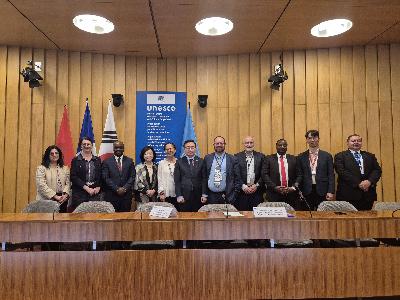
KISTI and UNESCO Launch Full-Scale International Cooperation on Open Science
KISTI and UNESCO Launch Full-Scale International Cooperation on Open ScienceHigh-Level Inaugural Event Held at UNESCO Headquarters in Paris - Collaboration begins in Open Data, Diamond Open Access, and Software Heritage preservation - Collaboration aims to build an inclusive scientific ecosystem for the Global South, including Asia and Africa □ The Korea Institute of Science and Technology Information (KISTI) announced that it successfully co-hosted a “High-Level Launch Event for Strengthening Cooperation in Open Science” with UNESCO on Friday, June 6, at UNESCO Headquarters in Paris, France. The event was broadcast live worldwide both onsite and online. □ Jointly organized by KISTI, UNESCO, and the Permanent Delegation of the Republic of Korea to UNESCO, the event marked the official launch of full-scale cooperation between the two institutions. This collaboration will focus on key areas such as Open Data, Diamond Open Access*, and Software Heritage preservation. It aims to support the implementation of the UNESCO Recommendation on Open Science and contribute to the International Decade of Sciences for Sustainable Development. * Diamond Open Access is a non-profit scholarly publishing model that charges no fees to authors or readers, and is typically managed by academic communities or publicly funded institutions. □ The event brought together approximately 70 high-level representatives from around the world, including officials from the Permanent Delegations of the People's Republic of China and the Slovak Republic to UNESCO, the French National Research Agency (ANR), and the Ministry of Higher Education, Science, Technology and Innovation of the Republic of Angola. Opening remarks were delivered by H. E. Ms. Bak Sang Mee, Ambassador and the Permanent Delegate of the Republic of Korea to UNESCO; Dr. Lee Sik, President of KISTI; Dr. Tawfik Jelassi, Assistant Director-General for Communication and Information of UNESCO; and Dr. Lidia Brito, Assistant Director-General for Natural Sciences of UNESCO. All speakers emphasized the importance of international cooperation, especially in the context of Open Science. □ In his remarks, KISTI President Dr. Lee Sik stated, “KISTI traces its roots back to 1962, when it was founded as the Korea Science and Technology Information Center (KORSTIC) with support from UNESCO, and has since upheld the spirit of international cooperation in scientific knowledge. This project marks a significant milestone in building an inclusive scientific ecosystem that benefits the Global South**, including Asia and Africa.” ** Global South refers not to geographic southern regions but to developing and low- and middle-income countries in political, economic, and historical contexts. □ During the presentation session, KISTI and UNESCO shared the framework of their cooperation and outlined their future vision. A high-level roundtable discussion followed, addressing key topics such as: - Advancing Policies and infrastructure for Diamond Open Access - Preserving software source code as part of the global Software Heritage - Sharing knowledge globally through inclusive strategies □ Dr. Song Sakwang, the project lead at KISTI, stated, “KISTI holds world-class expertise and infrastructure in Open Data, Open Access, and Open Software. We are committed to supporting the enhancement of Open Science capacities across Asia and Africa based on these strengths. Through this initiative, KISTI aims to become a global leader in Open Science and further strengthen Korea’s international standing.” □ The KISTI-UNESCO cooperative project will be implemented over a five-year period from March 2025 to December 2029. It will focus on building inclusive digital infrastructure, expanding institutional support, and developing innovative international cooperation models for Open Science. The initiative will be implemented through regional pilot projects, policy framework development, and capacity-building programs. -
162025. 05
No. 217 View. 30247

KISTI Begins Construction of Korea’s 6th National Supercomputer, Expected to Ran...
KISTI Begins Construction of Korea’s 6th National Supercomputer, Expected to Rank Among World’s Top 10 - Signed contract worth KRW 382.5 billion with global supercomputer manufacturer HPE- Equipped with 8,496 GPUs to meet massive computational demands for AI+S&T and more □ The Korea Institute of Science and Technology Information (KISTI) announced on May 12 that it has signed a final contract with Hewlett Packard Enterprise (HPE) for the construction of Korea’s 6th national supercomputer. The contract is valued at KRW 382.5 billion, including KRW 78 billion for five years of maintenance. □ HPE, the contracted company, possesses proprietary network technology specialized for supercomputers and has extensive experience in building large-scale systems. In the TOP500 list of the world’s supercomputers published in November 2024, HPE systems ranked 1st (El Capitan, USA, 2.7 EFlop/s), 2nd (Frontier, USA, 2.0 EFlop/s), and 5th (HPC6, Italy, 607 PFlop/s), with a total of 106 entries on the list. ※ 1 PetaFlop/s = 1 quadrillion (1,000 trillion) calculations per second □ The 6th National Supercomputer is scheduled for completion in the first half of 2026. It will serve as a national flagship high-performance computing (HPC) service, supporting research and development in high-precision scientific and engineering simulations as well as large-scale artificial intelligence in an increasingly AI-driven global R&D and industrial environment. □ The system will be equipped with 8,496 of NVIDIA’s latest GPUs, including the GH200 model, and will feature computing performance of approximately 600 PFlop/s, 205 petabytes of storage, and ultra-fast networking with speeds over 400 Gbps. It is expected to rank within the top 10 of the TOP500 list. ※ GH200: A CPU+GPU integrated accelerator chip that enhances data processing efficiency by combining the H100 architecture with the ARM-based ‘Grace’ CPU □ This configuration is expected to be highly effective not only for AI training and inference, but also for scientific computing, simulation, and research on large-scale AI models. It will significantly enhance national R&D productivity. □ On March 12, the Korean Ministry of Science and ICT announced the "AI+S&T Promotion Plan," aimed at responding to the global shift toward AI-centered R&D. The plan seeks to accelerate the integration of AI into Korea’s relatively early-stage scientific and technological research ecosystem. □ In particular, the plan promotes the development of eight specialized AI models across fields such as next-generation materials, innovative new drugs, and ultra-fine semiconductors. This "S&T Innovation Acceleration" strategy aims to revolutionize existing R&D and secure AI-based technologies optimized for scientific knowledge creation. ※ AI+S&T Specialized AI Model Fields: Next-generation materials, innovative new drugs, ultra-fine semiconductors, space exploration, quantum computing, next-generation secondary cells, eco-friendly technologies, future energy □ There is currently a significant shortage of shared high-performance GPU infrastructure in the public sector. As a result, researchers often need to purchase expensive GPUs individually or rely on overseas cloud services using R&D budgets. This not only imposes a heavy financial burden but also raises concerns over research data security and potential leakage. □ To address this, KISTI plans to immediately begin supporting various computational demands—including large-scale scientific computing, data analysis, AI+S&T research, and medium-to-large AI development*—upon completion of the 6th National Supercomputer. * Medium-to-large AI development refers to training or scientific computation tasks using 50 to 200 GPUs over a period of up to 3 months. □ Considering that the accumulated demand for GPU usage in research and industrial fields cannot be resolved all at once, discussions are also underway with financial authorities to establish a customized “AI+S&T Public Infrastructure.” This infrastructure will distribute the demand for specialized GPUs by research field and enable shared use among government-funded research institutes and others. ※ Examples include the following: (Materials) Development of innovative material technologies using multimodal AI (New Drugs) AI-based compound synthesis and drug property prediction (Energy) AI-driven fuel cell manufacturing processes (Smart Manufacturing) Autonomous AI manufacturing processes for semiconductor components □ Lee Sik, President of KISTI, stated, “The 6th National Supercomputer will serve as a core national infrastructure driving scientific and technological innovation in the AI era, providing domestic researchers with a safer and faster high-performance computing environment. KISTI will continue to play a leading role in establishing a public high-performance computing ecosystem and supporting national R&D competitiveness.” -
112025. 03
No. 216 View. 86187
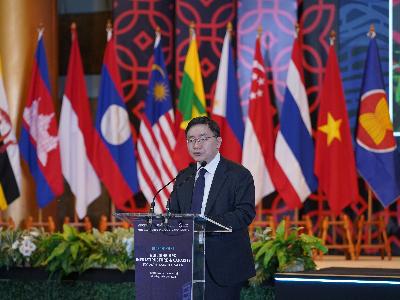
KISTI Holds Commemorative Event for Building HPC Infrastructure for ASEAN Data U...
KISTI Holds Commemorative Event for Building HPC Infrastructure for ASEAN Data Utilization - Expectation for Continued Digital Cooperation Between Korea and ASEAN - The Korea Institute of Science and Technology Information (KISTI) announced that it held a commemorative event for the Building HPC Infrastructure and HPC Capacity for ASEAN Data Utilization project on March 10 at the Indonesian National Research and Innovation Agency (BRIN) in Jakarta, Indonesia. As part of the Korea-ASEAN Digital Flagship (KADIF)*, the HPC infrastructure and capacity enhancement initiative is an international cooperation project supported by the ASEAN-Korea Cooperation Fund (AKCF), provided by the Korean government. With a budget of USD 10 million (approximately KRW 14.7 billion), the project will run for four years from September 2024 to 2028. Its goal is to enhance digital capabilities using data and AI by providing ASEAN member states (AMS) with an environment based on high-performance computing (HPC). * Korea-ASEAN Digital Flagship: An initiative by the Korean Ministry of Science and ICT to strengthen AI and digital capabilities in ASEAN, running from 2024 to 2029 with a total fund of USD 30 million from the AKCF. The main components of this international cooperation project include the construction of HPC infrastructure, the development of the National Science & Technology Information Service (NTIS), and the KISTI-ASEAN Data & AI Training Program for HPC, which will train 160 participants over four years. Currently, eight AMS, excluding Thailand and Singapore, do not possess HPC infrastructure. In particular, there is a significant shortage of GPU- and NPU-based HPC environments, which are crucial for data and AI capabilities. This project aims to establish research infrastructure in AMS that currently lack HPC environments, while leveraging KISTI’s expertise in HPC operations and AI technologies to bolster the digital competitiveness of these states. Kao Kim Hourn, Secretary-General of ASEAN, stated, “Building HPC, a core research infrastructure between ASEAN and Korea, will greatly contribute to enhancing the digital and scientific competitiveness of ASEAN member states. Moreover, we will actively support the creation of a continuous digital cooperation framework between ASEAN and Korea.” Lee Jang-keun, Ambassador of the Republic of Korea to ASEAN, stated, “We congratulate the Korea-ASEAN Digital Flagship, which was announced at the 24th ASEAN-Republic of Korea Summit, for taking its first tangible step through this event. By building HPC infrastructure, we aim to create new opportunities for digital innovation cooperation that did not previously exist between Korea and ASEAN, and to establish a digital cooperation model based on research capabilities.” Lee Sik, President of KISTI, stated, “We hope that the establishment of HPC infrastructure for ASEAN data utilization through this project will contribute to strengthening the digital capabilities of ASEAN member states and, furthermore, serve as an opportunity to lay the foundation for Korea-ASEAN scientific and technological cooperation.” -
112025. 02
No. 215 View. 105456
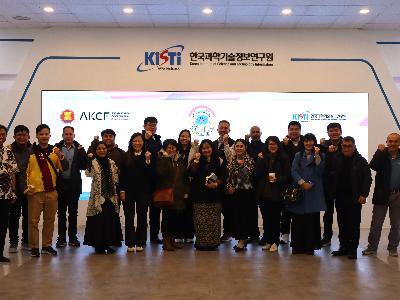
KISTI promotes its first training program to build HPC-based data utilization in...
KISTI promotes its first training program to build HPC-based data utilization infrastructure for ASEAN member states (AMS) The Korea Institute of Science and Technology Information (KISTI) announced that it will conduct the first KISTI-ASEAN Data & AI Training Program for HPC from February 10 to 14, aiming to build HPC-based infrastructure for data utilization over a five-day period. The Building HPC Infrastructure and HPC Capacity for ASEAN Data Utilization project, supported by a $10 million budget from the ASEAN-Korea Cooperation Fund (AKCF) over four years (from September 2024 to 2028), aims to foster key talents in AI and data utilization. By transferring KISTI's expertise in HPC utilization to ASEAN countries, the project seeks to enhance their ability to leverage data through supercomputing infrastructure, research networks, and the National Science & Technology Information Service (NTIS) to advance science and technology in ASEAN member states (AMS). The training program under this project is designed to train a total of 160 professionals over four years, with two sessions per year, each accommodating 20 participants, for a total of eight sessions. Through this training program, KISTI plans to nurture experts in AMS that lack HPC infrastructure, leveraging its expertise in HPC operations and AI technologies to help bolster their scientific and technological competitiveness. The training program includes the following courses: ▲4th Industrial Revolution (Focusing on AI); ▲Linux Training; ▲Machine Learning Model with Teachable Machine; ▲Understanding Supercomputer (5th) & Utilization; ▲Supercomputing Utilization; ▲High Performance Supercomputing Networking; ▲Introduction of NTIS and Usage; ▲Supercomputing for AI. Sik Lee, President of KISTI, stated, “We hope this training program will contribute to fostering key HPC talents in ASEAN and further serve as a foundation for strengthening Korea-ASEAN cooperation in science and technology.” -
282024. 11
No. 214 View. 119446

KISTI-Inria-KAIST Hold Joint Collaboration Seminar on AI and HPC
KISTI-Inria-KAIST Hold Joint Collaboration Seminar on AI and HPC - Following the signing of the MOU for collaboration in AI, HPC, and quantum computing, efforts to identify joint research topics intensify - The Korea Institute of Science and Technology Information (KISTI, President Lee Sik) announced that it co-hosted a seminar on AI and High-Performance Computing (HPC) on the 27th with the French National Institute for Research in Digital Science and Technology (Inria) and KAIST. The event took place at the Seoul AI Hub Education Center (Yangjae). Inria is a national research institute in France established in 1967 to promote scientific and economic development. It is composed of approximately 4,000 researchers and 225 project teams working in the field of digital science and technology. After signing a Memorandum of Understanding (MOU) with Inria in June 2023, KISTI identified common interests in AI and HPC in January 2024 and organized the seminar to explore potential joint research topics. The seminar included sessions on the AI research progress at KISTI, Inria, and KAIST, as well as discussions on the latest research in Generative AI and AI technologies using supercomputers. KISTI President Lee Sik expressed his expectation that the seminar will serve as a catalyst for KISTI, Inria, and KAIST, all leaders in the AI and HPC fields, to collaborate and produce excellent outcomes in joint research. -
072024. 11
No. 213 View. 103871

ScienceON Now Offers Science and Technology Lecture Videos, Expanding Video Cont...
ScienceON Now Offers Science and Technology Lecture Videos, Expanding Video Content in Collaboration with KAOS Foundation-Strengthening Accessibility to S&T Information and Enhancing Public Scientific Literacy, Expanding from Literature-Based Information to Video Content- The Korea Institute of Science and Technology Information (KISTI) announced that ScienceON, its science and technology knowledge infrastructure, will now offer basic science video content in collaboration with the KAOS Foundation. * ScienceON (https://scienceon.kisti.re.kr) is an open collaboration research platform that integrates and provides scientific and technological information such as domestic and international papers, patents, national R&D reports, research data, information analysis services, and research infrastructure in one place. This marks an expansion from the traditional literature-based scientific and technological information to video content, and highlights the significance of providing multimedia information, which will be more familiar to academic information users. The KAOS Foundation is a nonprofit public foundation established in 2014 to popularize science and mathematics. A science committee composed of scholars from the scientific community selects topics and participates in delivering scientific knowledge to the public in an easy and engaging manner. ScienceON will provide a variety of scientific video content, including regular ‘KAOS Lectures’ and ‘Expert Interviews’. On the ScienceON website, a Science and Technology Video menu has been added under the Trends category, allowing users to search for these videos along with other information resources. Users now have access to not only papers, patents, reports, trends, and researcher information, but also scientific and technological video content. This provides them with an opportunity to understand science and technology more easily through visual experiences. This change is expected to help the general public access scientific and technological information more efficiently and contribute significantly to raising awareness among a broader audience. KAOS Foundation's General Secretary, Jeon Hoon, stated,“We are delighted to present the foundation's basic science content on ScienceON, which is a leading science and technology knowledge platform with a large number of users. We will continue our efforts to make diverse and in-depth scientific knowledge more accessible and entertaining for the public.” KISTI's Convergence Service Center Director, Yoo Suhyeon, commented, “Scientific and technological information is a constantly evolving field, and there is a need for opportunities to make science and technology more accessible to the public. Through this collaboration with the KAOS Foundation, we aim to enhance users' understanding of academic information by providing high-quality lecture videos and achieve the goal of popularizing scientific and technological information and improving accessibility.” She further added, “We expect that the scientific and technological video content will not only engage users but also help bridge the gap between researchers and the general public. Moving forward, we will expand the range of scientific and technological information and formats available on ScienceON, reinforcing its role as a hub for scientific and technological knowledge.” -
302024. 09
No. 212 View. 106295
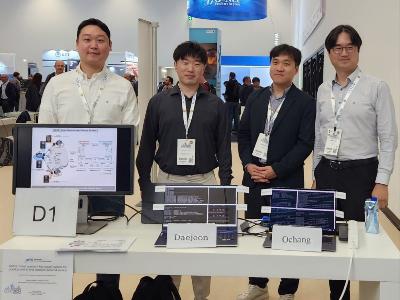
KISTI Demonstrates Quantum Key Service Technology at ECOC, Europe’s Largest Opti...
KISTI Demonstrates Quantum Key Service Technology at ECOC, Europe’s Largest Optical Communications Conference - Laying the Foundation for Global Research Collaboration with Domestic and International Quantum Cryptography Networks Institutions - The Korea Institute of Science and Technology Information (KISTI) announced that the Quantum Network Research Center became the only Asian research team to present a technical demo at ECOC (European Conference on Optical Communication), Europe’s largest optical communications conference. The 50th-anniversary ECOC conference was held in Frankfurt, Germany, from September 22 to 26, 2024, with a total of eight technical demos being approved. On September 24, local time, KISTI researchers presented a demo of the Smart Quantum Key Supply System (SQSS), a technology for secure quantum key distribution in practical quantum cryptographic communication services. The demo showcased the encryption of securely shared quantum keys using Post-Quantum Cryptography (PQC) over PQC-TLS, which is more secure than traditional TLS (Transport Layer Security) technology. The demonstration also successfully highlighted a technology capable of intelligently and flexibly selecting encryption methods based on whether the user’s system supports Post-Quantum Cryptography. Lee Wonhyuk, Director of the Quantum Network Research Center, stated, “This technology is a core development for practical quantum cryptographic communication services, contributing technically to the activation of the quantum cryptography industry.” He added,“I expect that this demo will serve as a stepping stone for establishing a global research collaboration framework with domestic and international institutions involved in quantum cryptographic communication networks.” -
272024. 08
No. 211 View. 98624
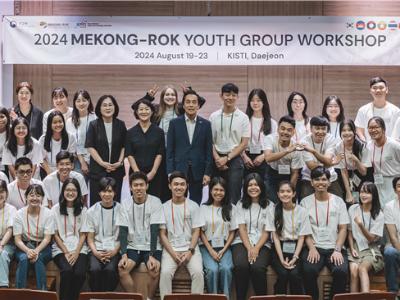
KISTI Hosts the 2024 Korea-Mekong Youth Group Workshop
KISTI Hosts the 2024 Korea-Mekong Youth Group Workshop - Strengthening Multilateral Cooperation Between Korea and the Mekong Countries Through S&T in cooperation with the Ministry of Foreign Affairs - The Korea Institute of Science and Technology Information (KISTI, President Kim Jae-soo) announced the hosting of the "2024 Korea-Mekong Youth Group Workshop" from August 19 to 23, a 5-day, 4-night event aimed at strengthening multilateral cooperation between Korea and the five Mekong countries (Cambodia, Laos, Myanmar, Thailand, and Vietnam) through science and technology, in collaboration with the Ministry of Foreign Affairs. Five Korean university students and 25 students from the Mekong countries who participated in this workshop toured KISTI's infrastructure, including the National Supercomputing Center’s 5th supercomputer, Nurion. They also received training from KISTI’s expert staff on topics such as supercomputing utilization, big data analysis, and artificial intelligence applications. Key lectures included ▲ understanding and utilizing supercomputing, ▲ AI-based research using supercomputers, ▲ urban disaster solutions through flood monitoring using Geographic Information System (GIS), ▲ AI-based hydrological applications for the Mekong River Basin, and ▲ smart traffic data analysis, focusing on practical applications and real-world case studies. Additionally, the students were divided into teams of different nationalities to conduct team projects aimed at developing multilateral international cooperation strategies between Korea and the Mekong countries through science and technology. Kim Ji-young, Director of KISTI's Scientific Data Education Center, stated, “We share the Ministry of Foreign Affairs' intention to continuously develop multilateral cooperation between the Mekong countries and Korea. With KISTI’s supercomputing and data science infrastructure and expertise, we hope to contribute to the training of future talents in the field of science and technology convergence for multilateral international cooperation.” Since its establishment in 2018, KISTI’s Scientific Data Education Center has been dedicated to providing specialized training programs using KISTI’s data, supercomputing infrastructure, and data science expertise. The center has been focused on training data science professionals (in DATA, HPC, and AI) and future talent, serving international organizations across industries, academia, research institutions, and government. * Scientific Data Education Center website: https://kacademy.kisti.re.kr/ -
082024. 08
No. 210 View. 98535
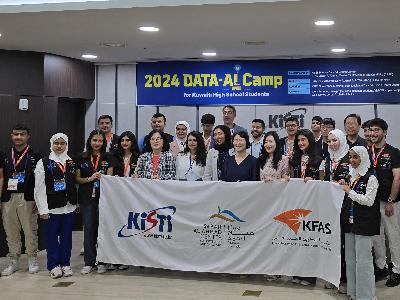
KISTI Hosts 2024 DATA·AI Camp for Kuwaiti High School Students
KISTI Hosts 2024 DATA·AI Camp for Kuwaiti High School Students - Enhancing Kuwaiti Youth’s Understanding of AI Technology and Promoting International Scientific Exchange - The Korea Institute of Science and Technology Information (KISTI, President Kim Jae-soo), in collaboration with the Kuwait Foundation for the Advancement of Sciences (KFAS), chaired by H. H. The Crown Prince Sheikh Meshal Al-Ahmad Al-Jaber Al-Sabah, hosted the "DATA·AI Camp for Kuwaiti High School Students" from July 31 to August 5, 2024. This camp, held for the third consecutive year since 2022, is designed to enhance Kuwaiti youth’s understanding of AI technology and promote international scientific exchange and cooperation. It achieved this through KISTI’s expert-led sessions and visits to its advanced infrastructure. The camp featured topics such as ▲ understanding the Fourth Industrial Revolution, ▲ programming through AI chatbots, and ▲ computational thinking team projects. A total of 16 Kuwaiti high school students participated in this year’s camp. Participants engaged in various activities, including, ▲ touring the Computing and Advanced Visualization Environment (CAVE), ▲ visiting the National Supercomputing Center, ▲ practicing with VlabON, an online math and science platform, ▲ utilizing the MyKSC web service portal for supercomputing. Students also participated in hands-on exercises involving supercomputers and modeling/simulation practices, experiencing firsthand KISTI’s advanced infrastructure. Building on the program’s success over the past three years, KISTI and KFAS signed an MOU in February 2024 to deepen their collaboration. This agreement focuses on ▲ conducting joint research to enhance digital capabilities and ▲ fostering future professionals through educational cooperation. Kim Ji-young, Director of KISTI’s Science Data Education Center, remarked, “This year’s camp marked the first event following the MOU between KISTI and KFAS. We tailored the program to provide students with extensive exposure to Korea’s advanced scientific platforms and culture. By emphasizing hands-on, team-based projects, we encouraged students to take a proactive approach to problem-solving. We hope this experience inspires Kuwaiti students to grow into global scientific leaders who will drive the Fourth Industrial Revolution.” The Science Data Education Center at KISTI develops and operates specialized educational programs for professionals across industries, academia, research institutions and government, as well as for future talent. These programs leverage KISTI’s expertise in scientific data, supercomputing infrastructure, and data science. * Scientific Data Education Center website: https://kacademy.kisti.re.kr/ -
312024. 07
No. 209 View. 100862
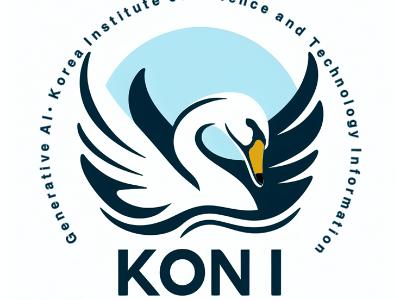
KISTI Unveils New Version of KONI, Science and Technology-Specialized Generative...
KISTI Unveils New Version of KONI, Science and Technology-Specialized Generative Large Language Model - Expectation for Accelerating Innovation in Scientific Research through Large-Scale Training Data and RAG Technology - The Korea Institute of Science and Technology Information (KISTI, President Kim Jae-soo) announced on July 31 the release of a new version of its science and technology-specialized generative large language model (LLM), KONI (KISTI Open Natural Intelligence). The new version of KONI offers significantly enhanced performance compared to the original model developed in December of last year and is now publicly available for anyone working in science and technology fields to use. As a national research institute specializing in science and technology information, KISTI continues to lead the development of LLMs specialized in science and technology by consistently collecting and analyzing various national science and technology big data. The newly released version of KONI is available in two models: KONI-Llama3-8B (pre-trained LLM) and KONI-Llama3-8B-Instruct (Chat model). The newly released models were trained with data containing over twice the amount of science and technology information compared to previous models, significantly improving performance in various tasks such as reasoning, writing, and comprehension. Notably, KONI achieved the top rank in the LogicKor benchmark leaderboard (https://lk.instruct.kr/) for comprehensive reasoning ability in Korean LLMs of the same size. KONI LLM, with a model size of just 8B, surpassed a LogicKor score of 8 points, reaching 8.21 points, setting a new milestone in Korean LLM development. KISTI KONI LLMs are available for unrestricted download and use through Hugging Face (https://huggingface.co/KISTI-KONI) and KISTI's AI Data Sharing and Utilization Service AIDA (https://aida.kisti.re.kr/). Additionally, KISTI has developed Retrieval-Augmented Generation (RAG) technology, utilizing data from existing information service systems to minimize hallucination phenomena typically occurring in LLMs. By integrating RAG technology with KONI, KISTI has developed a more reliable question-answering system. Performance verification and additional training based on feedback from researchers have further improved KONI's capabilities, particularly in the domain of science and technology-related laws, regulations, and guidelines. Moving forward, KISTI plans to continuously collect national science and technology data and periodically release new versions of KONI in various model sizes with enhanced performance. KISTI will also develop and distribute domain-specific LLMs reflecting the needs of public institutions in sectors such as defense, energy, and policy, as well as national research institutions. KISTI President Kim Jae-soo stated, “With the new version of KONI, we plan to revolutionize the distribution and analysis systems of science and technology information across various fields, including science, technology, and industry, and ultimately build an autonomous AI researcher—an AI Agent framework based on KONI—to support scientific discoveries.”

 Delete Article!
Delete Article!